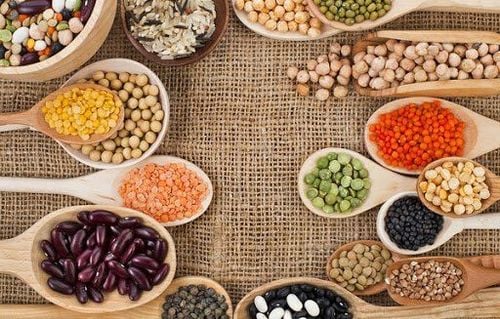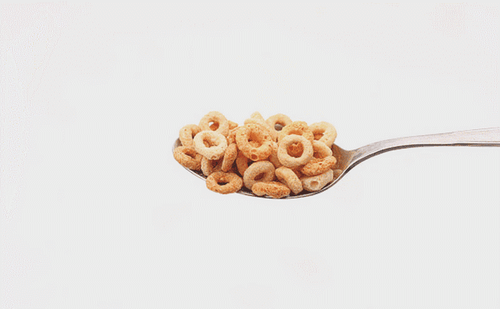This is an automatically translated article.
Healthy nuts are nutrient-dense foods high in unsaturated fats and bioactive compounds. Regular consumption of nuts is unlikely to cause obesity and may even help with weight loss.
1. Learn about the nutritional value of nuts
Nuts are the fillings of fruits that are widely used in cooking as a healthy snack. Epidemiological studies show that people who regularly eat nuts have a reduced risk of coronary heart disease and gallstones in both sexes, and diabetes in women. In addition, blood pressure, visceral fat, and metabolic syndrome also seem to be positively affected by nut consumption. Nuts are high in fat but are all healthy fats, and nuts are also a perfect source of fiber and protein. Here are the benefits that nuts bring to your health.
1.1. Rich source of nutrients
28 grams of mixed nuts contain:
Calories: 173 Protein: 5 grams Fat: 9 grams unsaturated fat Carbs: 6 grams Fiber: 3 grams Vitamin E: 12% RDI Magnesium: 16% RDI Phosphorus: 13% RDI Copper: 23% RDI Manganese: 26% RDI Selenium: 56% RDI This is the standard amount for most nuts, but some are significantly higher in nutrients than others. Others. For example, one Brazil nut provides more than 100% of the Reference Daily Intake (RDI). As such, nuts in general are a great food for you to choose for a low carb diet.
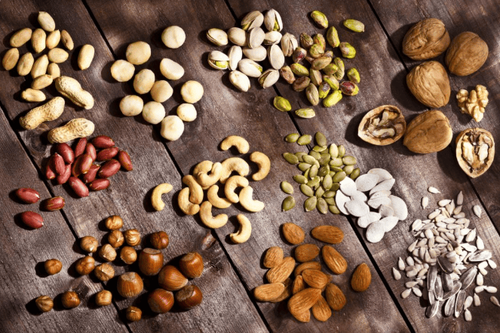
Các loại hạt tốt cho sức khỏe là những thực phẩm giàu dinh dưỡng, chứa nhiều chất béo không bão hòa và các hợp chất hoạt tính sinh học
1.2. Antioxidants
Antioxidants, including polyphenols in nuts, can fight oxidative stress by neutralizing free radicals - unstable molecules that can cause cell damage and increase risk diseases.
A published study found that walnuts are more resistant to free radicals than fish. The same researchers also show that the antioxidants in walnuts and almonds can protect the delicate fats in your cells from oxidative damage.
In a trial in a group of 13 people who ate walnuts or almonds with a meal there was an increase in polyphenols and a significant reduction in oxidative damage in a control meal.
Yet another study demonstrated that 2–8 hours after consuming whole pecans, participants experienced a 26–33% reduction in levels of oxidized “bad” LDL cholesterol – a major risk factor for disease heart .
However, most studies in older adults and people with metabolic syndrome show that walnuts and cashews do not have a major effect on antioxidant capacity, although some other markers have been found. improve.
1.3. Support weight loss
Nuts have been proven to have a very good effect on your weight loss process. The reason is that although most nuts are high in calories, our bodies do not absorb all of them, and some of the fat is still trapped in the fiber walls of the seeds during digestion.
For example, the nutrition information on a packet of almonds shows that a 28-gram serving has 160–170 calories, which your body absorbs only about 129 calories.
One large study showed the effects of the Mediterranean diet that people assigned to eat nuts lost an average of 5cm in waist circumference, significantly more than those given olive oil Liu .
In a study in overweight women, those who ate almonds lost nearly three times their weight and significantly reduced waist size compared to a control group.

Một nghiên cứu đã công bố cho thấy quả óc chó có khả năng chống các gốc tự do cao hơn cả cá
1.4. Can reduce Cholesterol and Triglycerid
One benefit that cannot be ignored is the effect of reducing LDL cholesterol, total triglycerides and increasing HDL cholesterol levels. The cholesterol-lowering ability of nuts may be due to their high content of monounsaturated and polyunsaturated fatty acids.
In a 3-month study in a group of obese people, those who ate pistachios had almost 33% lower triglyceride levels than the control group. Almonds and hazelnuts also have similar effects. Another study in women with metabolic syndrome observed that eating 28 grams of a mixture of walnuts, peanuts, and pine nuts per day for more than 1 month significantly reduced all types of cholesterol. - except "good" HDL
1.5. Beneficial effects for patients with type 2 diabetes and metabolic syndrome
Type 2 diabetes is a common disease affecting hundreds of millions of people worldwide.
Metabolic syndrome refers to a group of risk factors that can increase the risk of heart disease, type 2 diabetes, and stroke.
And the special thing is that nuts are one of the best choices for people with the diseases and syndromes mentioned above because they are low in carbs by themselves and do not raise blood sugar much. Therefore, replacing nuts with high-carb foods will have a blood sugar-lowering effect.
Statistics show that eating nuts can also reduce oxidative stress, blood pressure and other health markers in people with type 2 diabetes and metabolic syndrome.
In a 12-week controlled study, people with metabolic syndrome who ate only about 25 grams of pistachios twice daily experienced an average of 9% decrease in fasting blood sugar.
Furthermore, compared with the control group, the group that ate the pistachios had greater reductions in blood pressure and C-reactive protein (CRP), a marker of inflammation associated with heart disease.
However, there is currently no clear evidence and not all studies have documented benefits from eating nuts in people with metabolic syndrome.
1.6. Reducing Inflammation
Inflammation is your body's way of protecting itself from injury, bacteria, and other harmful pathogens. However, chronic, long-term inflammation can cause damage to organs and increase the risk of developing the disease. Some studies show that eating nuts can reduce inflammation and promote healthy aging.
In a study of the Mediterranean diet, people whose diets were supplemented with nuts had 35% and 90% reductions in CRP-reactive protein and interleukin 6 (IL-6), respectively.
Similarly, nuts - which include pistachios, Brazil nuts, walnuts and almonds - have been found to have anti-inflammatory effects in healthy individuals and those with serious medical conditions. such as type 2 diabetes and kidney disease.
1.7. High in beneficial fiber
Various types of fiber act as prebiotics to help keep your gut bacteria healthy by fermenting fiber and converting it into beneficial short-chain fatty acids (SCFAs) . These beneficial short-chain fatty acids have powerful health implications for consumers, including improving gut health and reducing the risk of diabetes and obesity.
Plus, fiber also helps you feel full and reduces calorie intake from meals. Some studies say increasing fiber intake from 18 to 36 grams per day can lead to up to 130
1.8 fewer calories absorbed. May reduce the risk of heart attack and stroke
Many published studies show that nuts help reduce the risk of heart disease and stroke due to their benefits on blood cholesterol levels, artery function and inflammation. The researchers found that small, dense cholesterol particles may increase the risk of heart disease more than large cholesterol particles.
A Mediterranean diet statistic shows that people who eat nuts have a significant reduction in small LDL particles and an increase in large LDL particles, as well as an increase in "good" HDL cholesterol
Another study in which people with normal or high cholesterol levels were randomly assigned to consume olive oil or nuts with a high-fat meal. Those in the nut group had better arterial function and lower triglycerides than the olive oil group - no matter what their baseline cholesterol levels were.
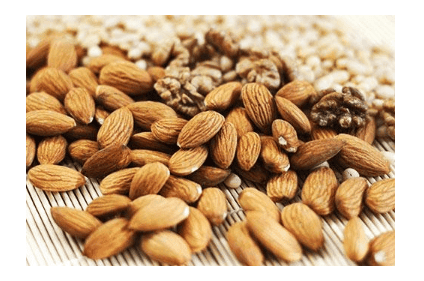
Các loại hạt có thể giảm Cholesterol và Triglycerid
2. Typical nuts with high nutritional content
2.1. Almonds
A serving of about 28 grams contains approximately:
Calories: 161; Fat: 14 grams; Protein: 6 grams; Carbs: 6 grams; Fiber: 3.5 grams; Vitamin E: 37% of the Reference Daily Intake (RDI); Magnesium: 19% of the RDI. Almonds help to lose weight, reduce blood pressure in overweight and obese people; Reducing inflammation in people with type 2 diabetes; Supports the growth of beneficial gut bacteria, including Bifidobacteria and Lactobacillus.
A meal with about 28 grams of almonds can help reduce the rise in blood sugar that occurs after a meal by up to 30% in people with diabetes but not significantly in people with good health.
2.2. Pistachios
A serving of about 28 grams contains approximately:
Calories: 156 Fat: 12.5 grams Protein: 6 grams Carbs: 8 grams Fiber: 3 grams Vitamin E: 3% RDI Magnesium: 8 % RDI Similar to almonds, pistachios also improve other heart disease risk factors, blood pressure, weight and oxidative status, lower blood sugar...
Plus, chestnuts Laughing can improve cholesterol levels, increase good cholesterol HDL when you eat about 56 - 84 grams a day
2.3. Walnuts
A serving of about 28 grams contains approximately:
Calories: 182 Fat: 18 grams Protein: 4 grams Carbs: 4 grams Fiber: 2 grams Vitamin E: 1% RDI Magnesium: 11% RDI Due to the high content of ALA in walnuts, it improves several heart disease risk factors, improving blood pressure and normal blood flow through your circulatory system; Significantly reduces bad LDL cholesterol and increases good HDL cholesterol.
In addition, it can reduce inflammation and have significant effects on the brain.
2.4. Cashews
A serving of about 28 grams contains approximately:
Calories: 155 Fat: 12 grams Protein: 5 grams Carbs: 9 grams Fiber: 1 gram Vitamin E: 1% RDI Magnesium: 20% RDI Nuts cashew has the effect of increasing antioxidant capacity, improving blood pressure in people with metabolic syndrome; increase levels of good cholesterol HDL...
2.5. Pecans
A serving of about 28 grams contains approximately:
Calories: 193 Fat: 20 grams Protein: 3 grams Carbs: 4 grams Fiber: 2.5 grams Vitamin E: 2% RDI Magnesium: 8% RDI Like other nuts, pecans also contain polyphenols, which are compounds that act as antioxidants; At the same time, pecans also work to reduce bad cholesterol LDL in people with normal cholesterol levels.
2.6. Macadamia nuts
A serving of about 28 grams contains approximately:
Calories: 200 Fat: 21 grams Protein: 2 grams Carbs: 4 grams Fiber: 2.5 grams Vitamin E: 1% RDI Magnesium: 9% RDI Because macadamia nuts themselves are high in monounsaturated fats, they are good for your heart health. The American Heart Association recommends: A diet rich in macadamia may even produce the same effects as a heart-healthy diet.
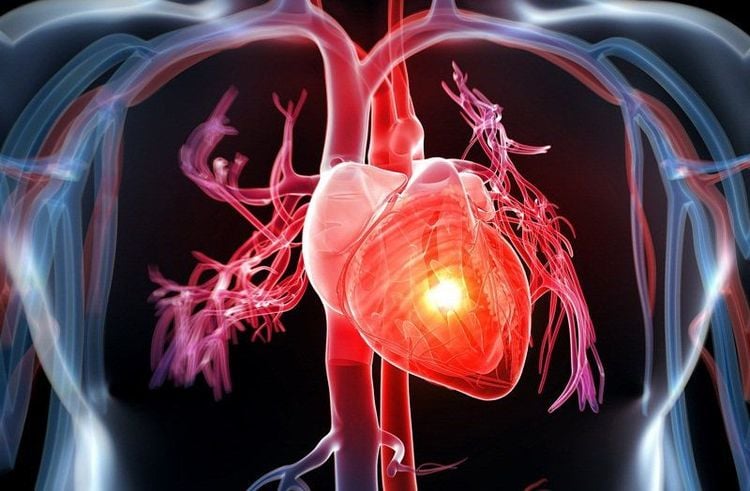
Nhiều nghiên cứu đã công bố cho thấy rằng các loại hạt giúp giảm nguy cơ mắc bệnh tim và đột quỵ
In addition, macadamia nuts also work to reduce both total cholesterol and "bad" LDL cholesterol in people with high cholesterol levels; anti-inflammatory...
2.7. Brazil nuts
A serving of about 28 grams contains approximately:
Calories: 182 Fat: 18 grams Protein: 4 grams Carbs: 3 grams Fiber: 2 grams Vitamin E: 8% RDI Magnesium: 26% RDI Selenium (a mineral that acts as an antioxidant): 100% of the RDI One particular fruit contains up to 100% of the recommended RDI per person to help prevent certain diseases when you supplement it into your daily diet. Especially for hemodialysis patients, when they ate at least 1 nut a day for three months their blood selenium levels returned to normal and the nuts had an antioxidant effect in their blood.
In addition, it has been shown to improve the function of blood vessels in obese adolescents, reduce inflammation in healthy people and those on hemodialysis.
2.8. Hazelnuts
A serving of about 28 grams contains approximately:
Calories: 176 Fat: 9 grams Protein: 6 grams Carbs: 6 grams Fiber: 3.5 grams Vitamin E: 37% RDI Magnesium: 20% RDI Hazelnuts have beneficial effects on cardiovascular disease risk factors; Reduce total bad cholesterol and average fat; reduce inflammatory symptoms; improves blood vessels; increase the amount of vitamin E in the blood.
2.9. Peanuts
A serving of about 28 grams of dry roasted peanuts contains approximately:
Calories: 176 Fat: 17 grams Protein: 4 grams Carbs: 5 grams Fiber: 3 grams Vitamin E: 21% RDI Magnesium: 11% of RDI Peanuts belong to the legume family, but its nutritional profile and health benefits are not inferior to that of nuts. Peanuts may improve cardiovascular risk factors. Women who ate peanut butter more than 5 times a week had lower rates of type 2 diabetes.
In summary, nuts are one of the healthiest snacks you can eat, as they contain many essential nutrients. Their beneficial effects are best utilized when there are no added ingredients such as added sugar or salt in the process of making them. When taken with a healthy diet that includes other natural foods, nuts can help reduce the causative factors of chronic diseases.
Please dial HOTLINE for more information or register for an appointment HERE. Download MyVinmec app to make appointments faster and to manage your bookings easily.
Reference source: healthline.com




